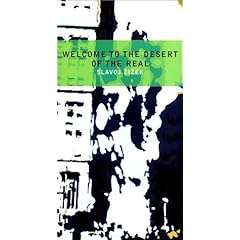 Slavoj Zizek is a sociologist, philosopher and cultural critic from Ljubljana, Slovenia. I'd never heard of him (or Ljubljana either, I must confess), until recently. Apparently, however, Zizek is "the Elvis of culture theory". The first time I heard of him it was because someone said he was a frequent quoter of GK Chesterton. My curiosity was piqued on both accounts.
Slavoj Zizek is a sociologist, philosopher and cultural critic from Ljubljana, Slovenia. I'd never heard of him (or Ljubljana either, I must confess), until recently. Apparently, however, Zizek is "the Elvis of culture theory". The first time I heard of him it was because someone said he was a frequent quoter of GK Chesterton. My curiosity was piqued on both accounts.So when I saw one of his books on my sister's coffee table a couple weeks ago (she's a Master's level literature student) I knew I had to put my other summer reading aside and give Zizek a go.
 It is hard to explain this book, let alone read it. It is a collection of five essays on 9/11 and its cultural/political aftermath. The back jacket of Welcome to the Desert of the Real (yes, its a line from The Matrix) says the following:
It is hard to explain this book, let alone read it. It is a collection of five essays on 9/11 and its cultural/political aftermath. The back jacket of Welcome to the Desert of the Real (yes, its a line from The Matrix) says the following:
"On September 11, the USA was given the opportunity to realize what kind of world it was a part of. It might have taken this opportunity -- but it did not; instead it opted to reassert its traditional ideological commitments; out with feelings of responsibility and guilt towards the impoverished Third World, we are the victims now!"
Agree with that or not, you have to admit that's a jarring perspective. But here's the part I want to comment on. In a section where he is talking about the US government's first response to 9/11 Zizek mentions the intriguing original title of their military campaign: "Infinite Justice".
Incidentally, this title was changed when Muslims complained that only God could administer infinite justice. My question is whether any Christians bothered to point that out. Zizek then refers to Jacques Derrida's post-9/11 comments, which were sympathetic to victims, but refused to declare anyone "politically guiltless". Then Zizek makes a bold proposition. Regarding Derrida self-critical stance, he writes:
"This self-relating, this inclusion of oneself in the picture, is the only true 'infinite justice.'" Quoting Hegel, he elaborates: "Evil resides (also) in the innocent gaze itself which perceives Evil all around."
If I'm reading him right, the point is that the only infinite justice is when no one claims the higher ground and real dialogue is able to take place. This is a profound and important thing that I think we all need to hear. But I think it over-states itself.
I agree that there is more justice in this kind of humble dialogue than the alternative, but how can this be called infinite? I suppose it offers infinite possibilities, and hope for justice, but such dialogue can only be the firstfruits of justice, and not the fulfillment of it in all its potential (which is implied by the adjective "infinite".
Reading Miroslav Volf's Exclusion and Embrace raises a few questions for me that I would like to put to Zizek:
Even once dialogue has begun, one has to wonder if injustice will be dealt with in the general or in the particular? How specific will we get in sorting out injustices? Will we stop at 9/11s or will we talk about our verbal abuses, our power-plays in the boardroom, or neglect of children?
And will we stop at talking about it? Or will there be an attempt to right wrongs? And how will we discern those exactly? And can they be righted, fully? To what extent?
And will wrong be punished? And if so, how can it be punished without adding new injustices? If not, how is there justice if the rapist steals from the raped and leaves it at thate, the murderer kills and yet gets to live in place of thes victim, the abuser inflicts pain and it ends there?
Will wrongs be forgiven? Or forgotten? On what basis and how and by who?
In what sense would facing and discussing our guiltlessness be "infinite justice"? Perhaps, though important, it is only a beginning, like fear of God is to wisdom. Even then, I would suggest that this is only the beginning as far as we are concerned, but that infinite justice must and does begin (and end) somewhere else; in someone else. Someone more humane than humans. Someone with the innocence, clarity, and power to discern and judge injustice, to punish wrongdoers, and to yet offer freedom from those wrongs.
This is a tall order. And I would suggest that if not for Jesus Christ, there would not be any hope. There is a lot of injustice out there. And even Jesus' answer was to answer the injustice of the world with an even greater injustice, an "infinite injustice", if you will. The Innocent Divine dies for the Guilty Humanity.
I think Zizek and Derrida have us onto a very crucial self-critical and dialogical stance, but still leave us a ways to go. Infinite justice can only be really be approached in the context of some larger redemptive plan involving someone like the Christ.
2 comments:
Fascinating stuff Jon.
Zizek may have been better off saying that this is the only way to BEGIN infinite justice, I can't imagine that he meant it ends this way. He could have expanded upon his point more thoroughly.
I wonder what he would make of your interpretation, you should send it to him.
Post a Comment